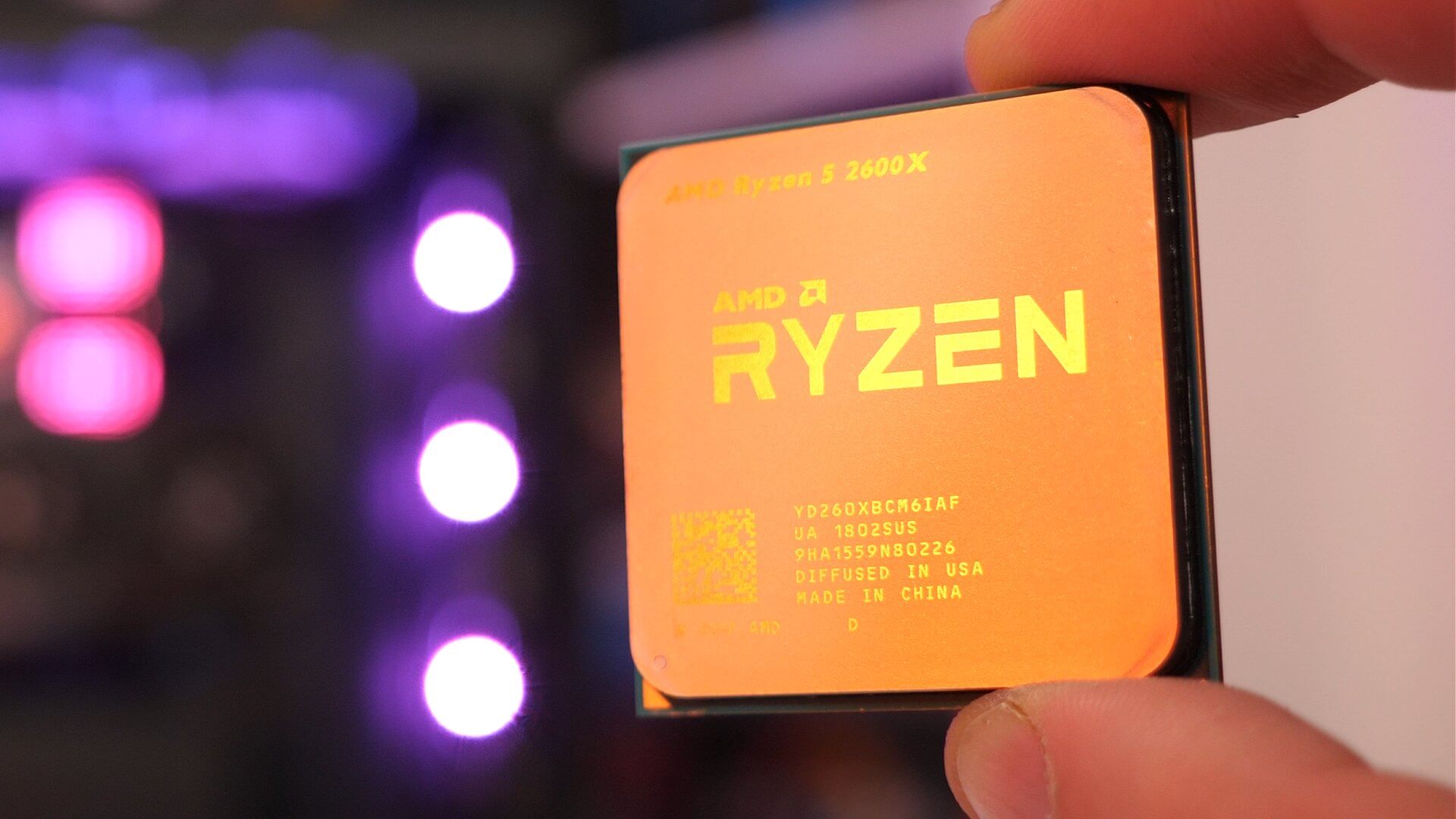Gaming Performance
For those of you hoping to see vastly improved gaming performance, you're going to be disappointed, though there are some decent results here and there. For Ashes of the Singularity, the 2700X only matched the 1800X while the 2600X was a good bit faster than the 1600.
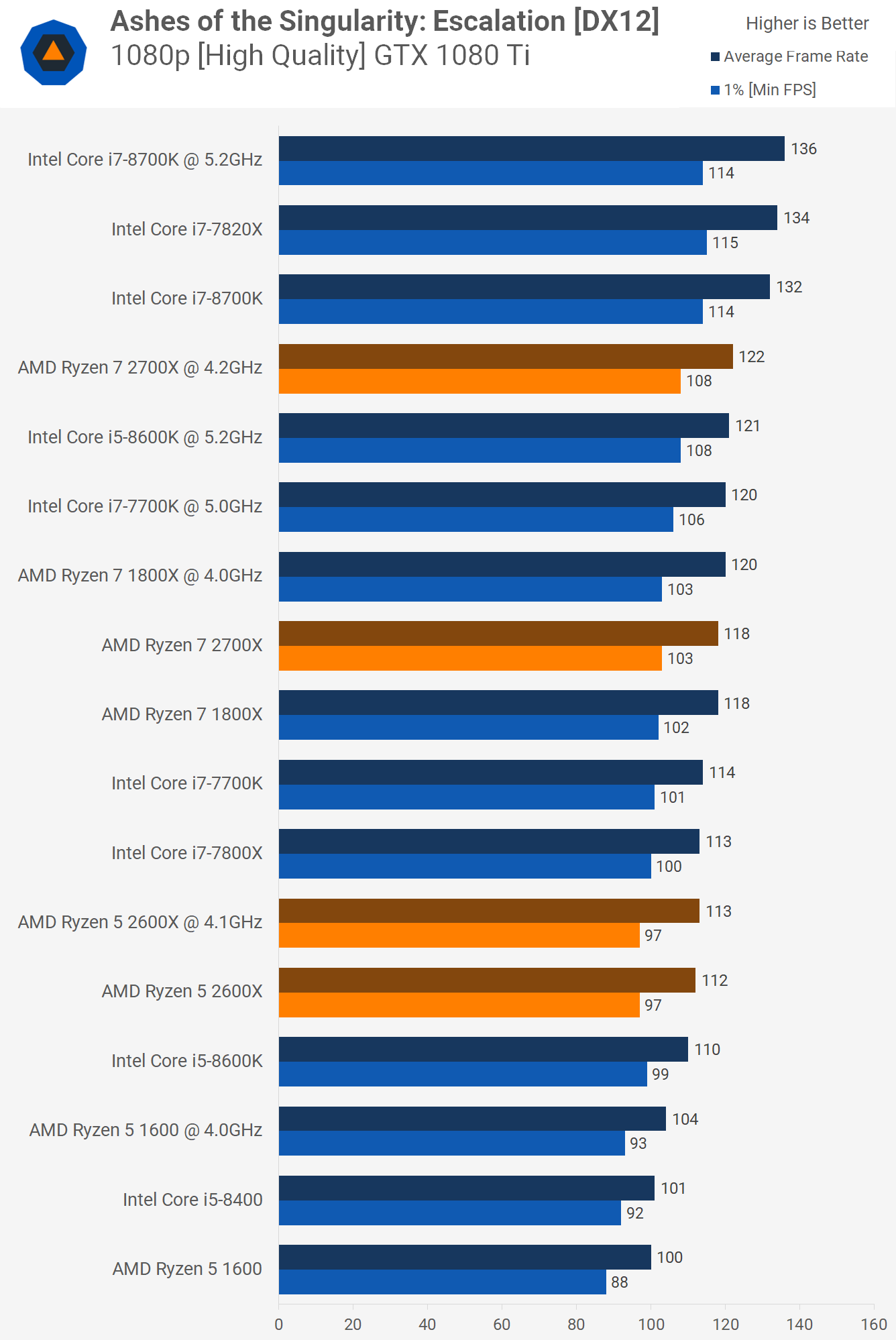
Overclocking did little for the 2600X while the 2700X enjoyed a decent performance uplift – nothing extreme, but it did overtake the overclocked 7700K and 8600K processors.
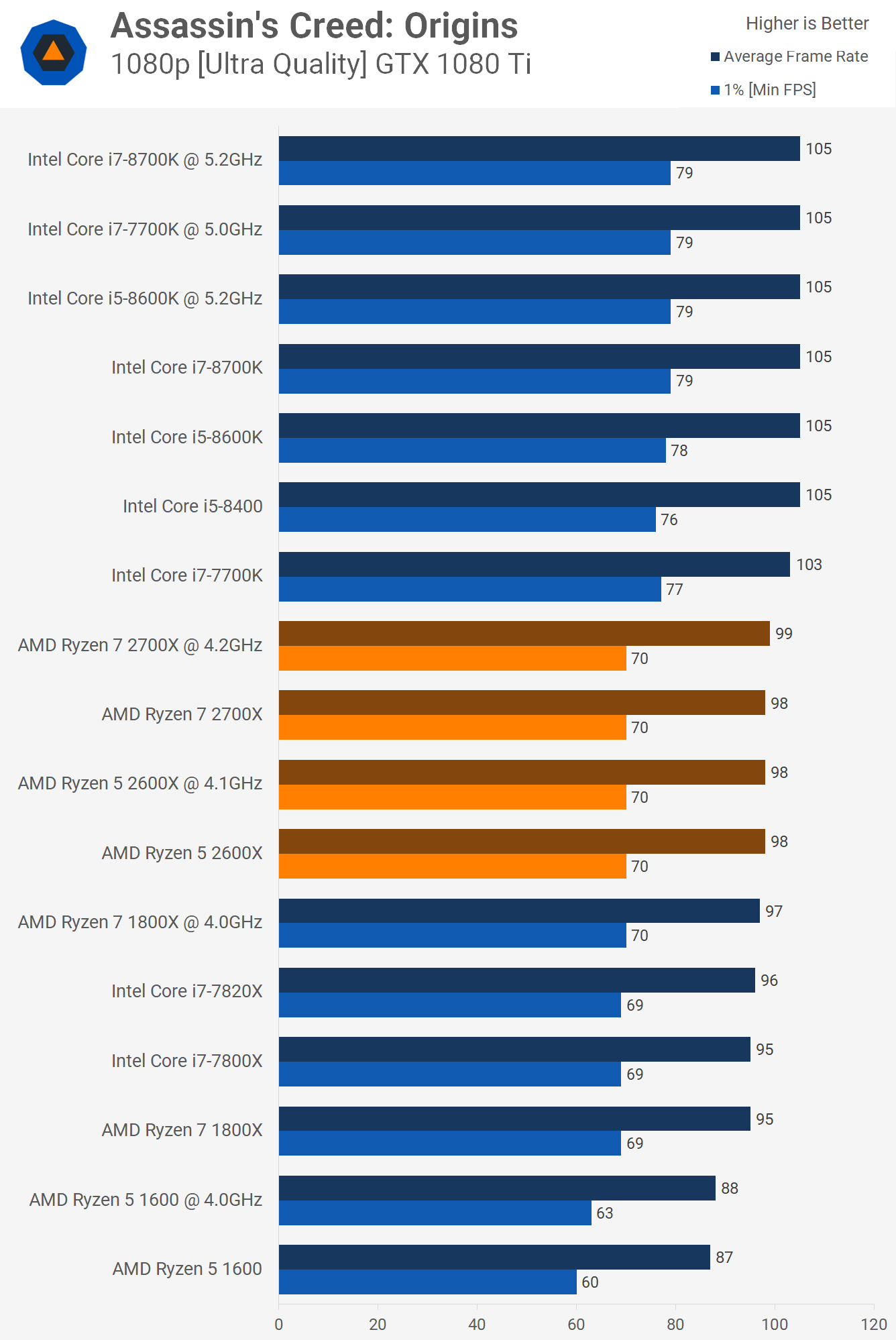
Moving on to Assassin's Creed Origins, we have a few noteworthy things to discuss here. Firstly, we are GPU-bound. Even with the GTX 1080 Ti at 1080p – the ultra quality settings are very demanding. Still, the Kaby Lake and Coffee Lake CPUs beat the Ryzen 7 1800X with ease and sadly the second-gen Ryzen CPUs aren't much faster than the 1800X.
However, it's worth nothing that they do still match the Skylake-X parts in this game and you'll see more of this as we look at other titles. Basically, this comes down to how the cores are connected and while extremely efficient for connecting up to 10 cores, the ring bus method doesn't scale beyond that too well and this is where Intel's mesh interconnect will take over. I'll discuss this more later in the article. For now, let's check Assassin's Creed again with a lower quality preset.
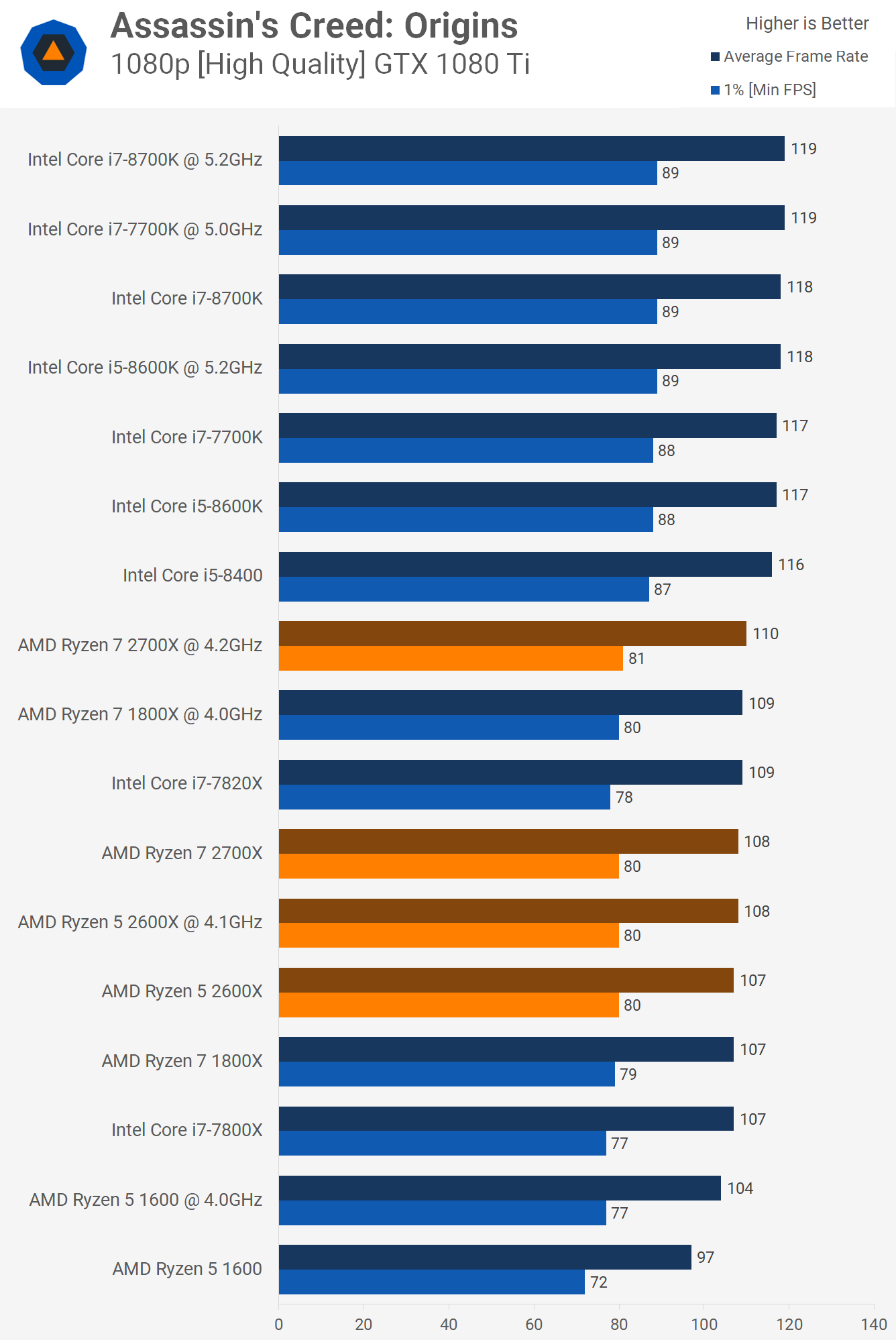
Dropping down to the high quality preset doesn't change much and we again see very similar performance trends. The 2700X and 2600X deliver basically the same results and again while on par with the Skylake-X parts they are quite a bit slower than the Kaby Lake and Coffee Lake CPUs.
Overclocking doesn't really help and the bottleneck here doesn't appear to be frequency related. The second-gen Ryzen CPUs also aren't able to improve on the performance of the 1800X which is disappointing to see.

Moving on to Battlefield 1, here we see similar results between the 2700X and 2600X with only 2-3 fps separating the two. Performance here is competitive though the 8700K completely walks away with the 1% low result hitting 120fps.
Overclocked, we see reasonable gains from the 2700X but again it trails the GPU limited Kaby Lake and Coffee Lake CPUs.

In an effort to remove or at the very least reduce the GPU bottleneck I've dropped down to the medium quality preset. Here the 2700X and 2600X again delivered similar results as Battlefield 1 doesn't require 16-threads --12 will happily get the job done. The 2700X still trailed the 8700K by an 18% margin and the 8600K by a 10% margin.
Again, overclocking doesn't really help that much. The 2700X saw the average frame rate increased by just 5% and that was only enough to match the stock 7700K. Meanwhile, the 8700K was 24% faster.
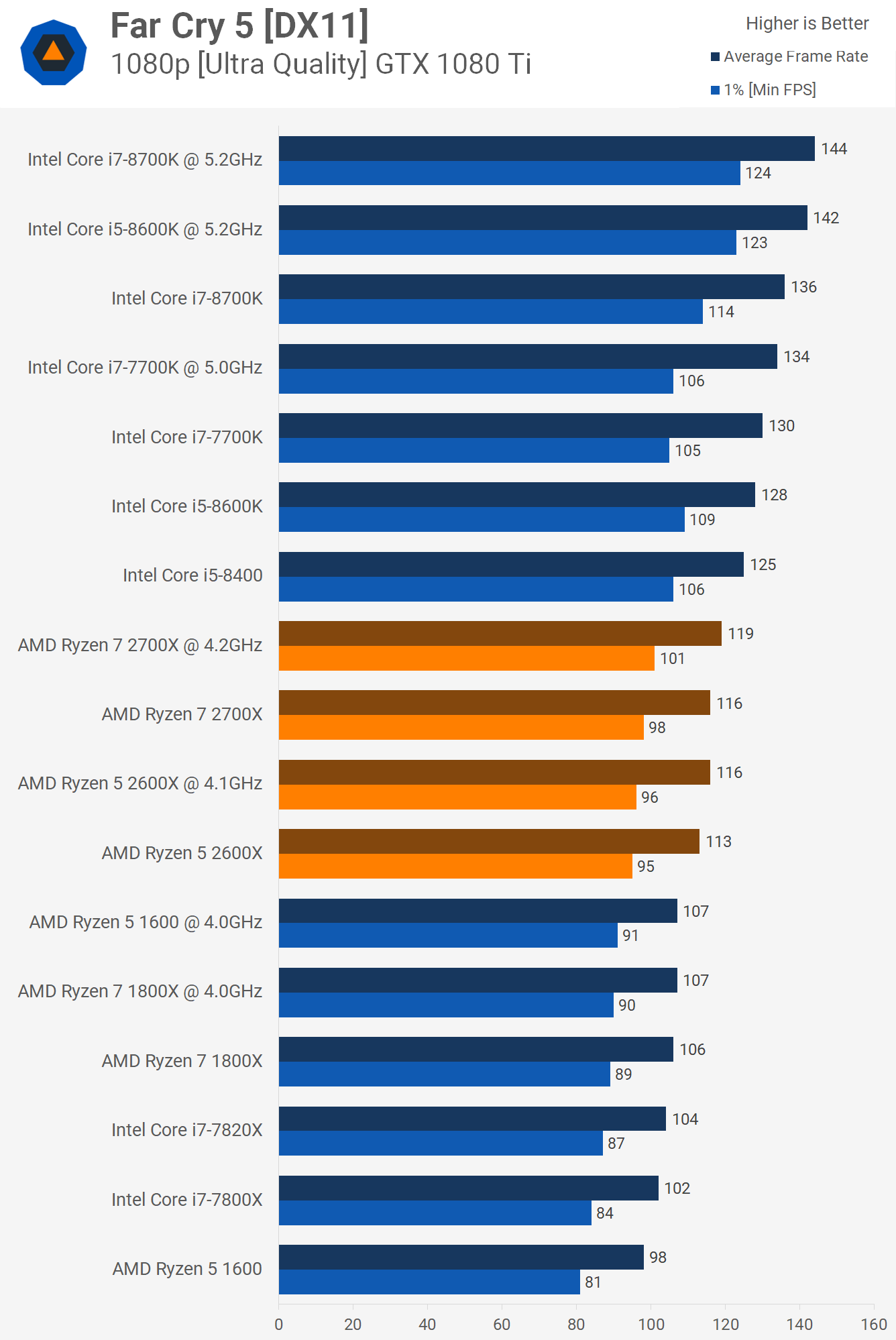
Next up we have Far Cry and again the 2700X is only slightly faster than the 2600X, though it does offer a noteworthy step forward from the 1800X. The 2700X was roughly 10% faster than the 1800X, which isn't bad.
Boosting the chip's frequency helped squeeze out a few more frames but the gains were even better with the Kaby Lake and Coffee Lake CPUs. The 8700K is now 21% faster for example.

Our Overwatch bot benchmark is very CPU intensive but the problem here is that we're artificially GPU limited as the game has a 300fps frame cap. That said, you'd expect the average frame rate to be much closer to the frame cap than it is. Before the bots engage, we are locked at 300fps but once they come together the frame rate for all CPUs drops down closer to 200fps.
I'm not quite sure what the limit is here, perhaps it has something to do with the game engine. I haven't used Overwatch to test high-end CPUs for a while. It was great for comparing two, four and six core CPUs but with today's high-end CPUs we seem to be pushing the game to its limits. Here we see that the Ryzen 7 2700X is fast enough to reach the limit and therefore it's able to roughly match the Intel CPUs.
Because of this apparent limit, the 2700X doesn't gain much from overclocking in this test and the 2600X doesn't typically gain much from its overclock, which can again be seen here.

Warhammer Vermintide 2 was slower with the GTX 1080 Ti on all tested CPUs when using DX12 so I've removed those results and stuck with DX11 exclusively. At 1080p, we're hitting the limits of the GTX 1080 Ti using the extreme quality settings and this sees the 2700X basically match the 8700K, here it trails the Intel CPU by 3-4fps.
Overclocking provides a few extra frames here and there but the gains are small because we're mostly GPU-limited.

Wrapping up the game benchmarks we have Vermintide 2 using the medium quality settings and here the 2700X was 9% faster than the 1800X while the 2600X was 13% faster than the 1600. Although the 2700X was 10% slower than the 8700K, it was 16% faster than the 7820X and that's a very interesting result.
Overclocked, we see small gains from the second-gen Ryzen CPUs and again, overclocking the 2600X looks to be a waste of time. I'll discuss this more when looking at the power consumption figures, which we might as well do right now.
